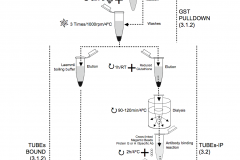
2012/03/19
Our researchers from Laboratory 3 at Proteomics Research Unit, have collaborated in the book "Ubiquitin Family Modifiers and the Proteasome"
Researchers from Laboratory 3 at Proteomics Research Unit, have collaborated in the book "Ubiquitin Family Modifiers and the Proteasome" with the chapter titled "Isolation of Ubiquitylated Proteins Using Tandem Ubiquitin-Binding Entities".
About this book:
The ubiquitin-proteasome system (UPS) and ubiquitin-related modifiers are not only involved in cellular protein quality control but also in the regulation of many fundamental cellular processes/pathways as well as in their disease-relevant aberrations. Ubiquitin Family Modifiers and Proteasome: Reviews and Protocols presents both novel developments in UPS research and important methods related to the main recent advances in the field of ubiquitin family modifiers. Divided into five convenient sections, this volume focuses on the enzymology and substrate identification of ubiquitin family modifiers, the recognition and chain formation of these modifiers, the analysis of proteasome biogenesis and function, protein quality control, and finally the use of small molecules and strategies to study or manipulate the function of the UPS and of ubiquitin family modifiers, respectively. Written in the highly successful Methods in Molecular BiologyTM series format, chapters include introductions to their respective topics, lists of the necessary materials and reagents, step-by-step, readily reproducible protocols, and notes on troubleshooting and avoiding known pitfalls.
CIC bioGUNE participation in this book:
This book includes state of art protocols written by specialist in the field. A book to have in the laboratories exploring functions regulated by ubiquitin and ubiquitin-like molecules. The capture of ubiquitylated proteins using Tandem Affinity Binding Entities is a method developed by our group that allows the capture of endogenous proteins modified by ubiquitylation without the need to use tagged forms of proteins. Therefore our technology can be used extract these proteins from cell lines, tissues and organs from animal models or samples from patients. Ubiquitylated proteins can be analyzed by simple Western -blot or immunoprecipitation if the identity of the protein (s) of interest is known of by mass spectrometry if they have to be identified.
Book available here
See a large version of the first picture





